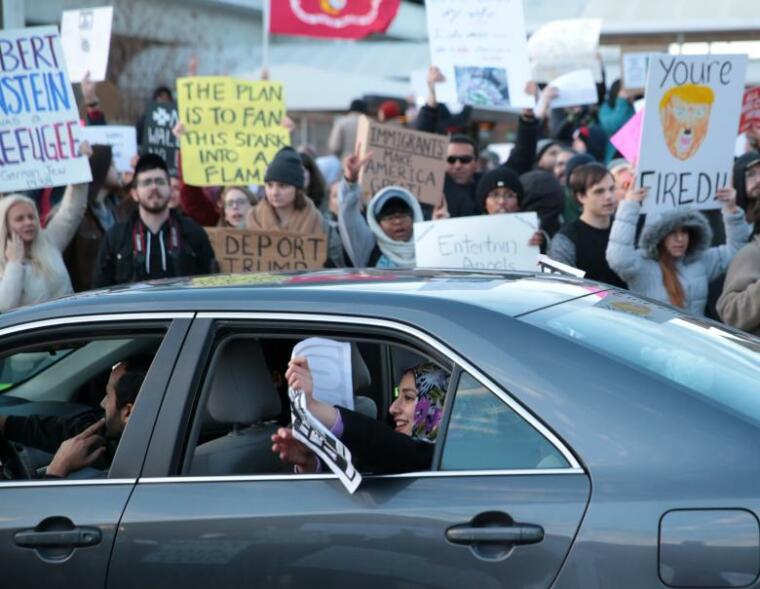White House issues expanded travel ban targeting 8 countries

The White House has issued a revised and expanded travel ban that restricts travel to citizens of eight countries following the expiration of the temporary ban on visitors from six Muslim-majority countries.
The revised travel ban, which is scheduled to take effect on Oct. 18, now includes Chad, North Korea and Venezuela to the previous list of countries that were in the previous ban, which restricted citizens of Iran, Libya, Somalia, Sudan, Syria and Yemen from entering the U.S.
Sudan had been left out of the new ban that was signed by President Donald Trump on Sunday, the same day the previous travel ban expired. Senior officials at the White House have said that Sudan had been taken off the list because it had demonstrated a level of cooperation on "national security and information-sharing."
The previous order had faced legal challenges from critics who called it a thinly veiled attempt to block Muslims from entering the country, which Trump and his advisers had discussed during and after last year's presidential campaign.
Following the announcement, the U.S. Supreme Court removed two cases involving the travel ban off its calendar and gave the parties in both cases until Oct. 5 to file new briefs over whether parts of the issue are now moot.
The president had called for a "tougher" travel ban following the recent explosion on a London subway. "The travel ban into the United States should be far larger, tougher and more specific-but stupidly, that would not be politically correct!" he tweeted.
Department of Homeland Security officials said that the new ban is aimed at countries that refuse to share information with the U.S. or have not taken necessary security precautions.
"The acting secretary has recommended actions that are tough and that are tailored, including restrictions and enhanced screening for certain countries," said Miles Taylor, counselor to acting Homeland Security Secretary Elaine Duke.
Officials have said that they worked on the new restrictions for months, in collaboration with various agencies and in conversation with foreign governments.
According to The Associated Press, the new restrictions on Venezuela would apply only to government officials and their immediate families, but it still includes a full ban on nationals from countries like Syria.
In developing the new restrictions, the DHS considered factors such as a nation's willingness to share intelligence about a traveler's history of criminal or terrorism-related acts and whether the country in question had the ability to issue electronic passports with embedded biometric information.
Following a global review of security procedures, administration officials found that 16 countries were not in compliance with the U.S. travel requirements, but by January, most of the countries in question had cooperated with the Trump administration to meet the requirements.
 Christians don't have to affirm transgenderism, but they can’t express that view at work: tribunal
Christians don't have to affirm transgenderism, but they can’t express that view at work: tribunal Archaeology discovery: Medieval Christian prayer beads found on Holy Island
Archaeology discovery: Medieval Christian prayer beads found on Holy Island Presbyterian Church in America votes to leave National Association of Evangelicals
Presbyterian Church in America votes to leave National Association of Evangelicals Over 50 killed in 'vile and satanic' attack at Nigerian church on Pentecost Sunday
Over 50 killed in 'vile and satanic' attack at Nigerian church on Pentecost Sunday Ukrainian Orthodox Church severs ties with Moscow over Patriarch Kirill's support for Putin's war
Ukrainian Orthodox Church severs ties with Moscow over Patriarch Kirill's support for Putin's war Islamic State kills 20 Nigerian Christians as revenge for US airstrike
Islamic State kills 20 Nigerian Christians as revenge for US airstrike Man who served 33 years in prison for murder leads inmates to Christ
Man who served 33 years in prison for murder leads inmates to Christ


 Nigerian student beaten to death, body burned over ‘blasphemous’ WhatsApp message
Nigerian student beaten to death, body burned over ‘blasphemous’ WhatsApp message 'A new low': World reacts after Hong Kong arrests 90-year-old Cardinal Joseph Zen
'A new low': World reacts after Hong Kong arrests 90-year-old Cardinal Joseph Zen Iran sentences Christian man to 10 years in prison for hosting house church worship gathering
Iran sentences Christian man to 10 years in prison for hosting house church worship gathering French Guyana: Pastor shot dead, church set on fire after meeting delegation of Evangelicals
French Guyana: Pastor shot dead, church set on fire after meeting delegation of Evangelicals ‘Talking Jesus’ report finds only 6% of UK adults identify as practicing Christians
‘Talking Jesus’ report finds only 6% of UK adults identify as practicing Christians Mission Eurasia ministry center blown up in Ukraine, hundreds of Bibles destroyed: 'God will provide'
Mission Eurasia ministry center blown up in Ukraine, hundreds of Bibles destroyed: 'God will provide' Church holds service for first time after ISIS desecrated it 8 years ago
Church holds service for first time after ISIS desecrated it 8 years ago Burger King apologizes for 'offensive campaign' using Jesus' words at the Last Supper
Burger King apologizes for 'offensive campaign' using Jesus' words at the Last Supper Uganda: Muslims abduct teacher, burn him inside mosque for praying in Christ’s name
Uganda: Muslims abduct teacher, burn him inside mosque for praying in Christ’s name